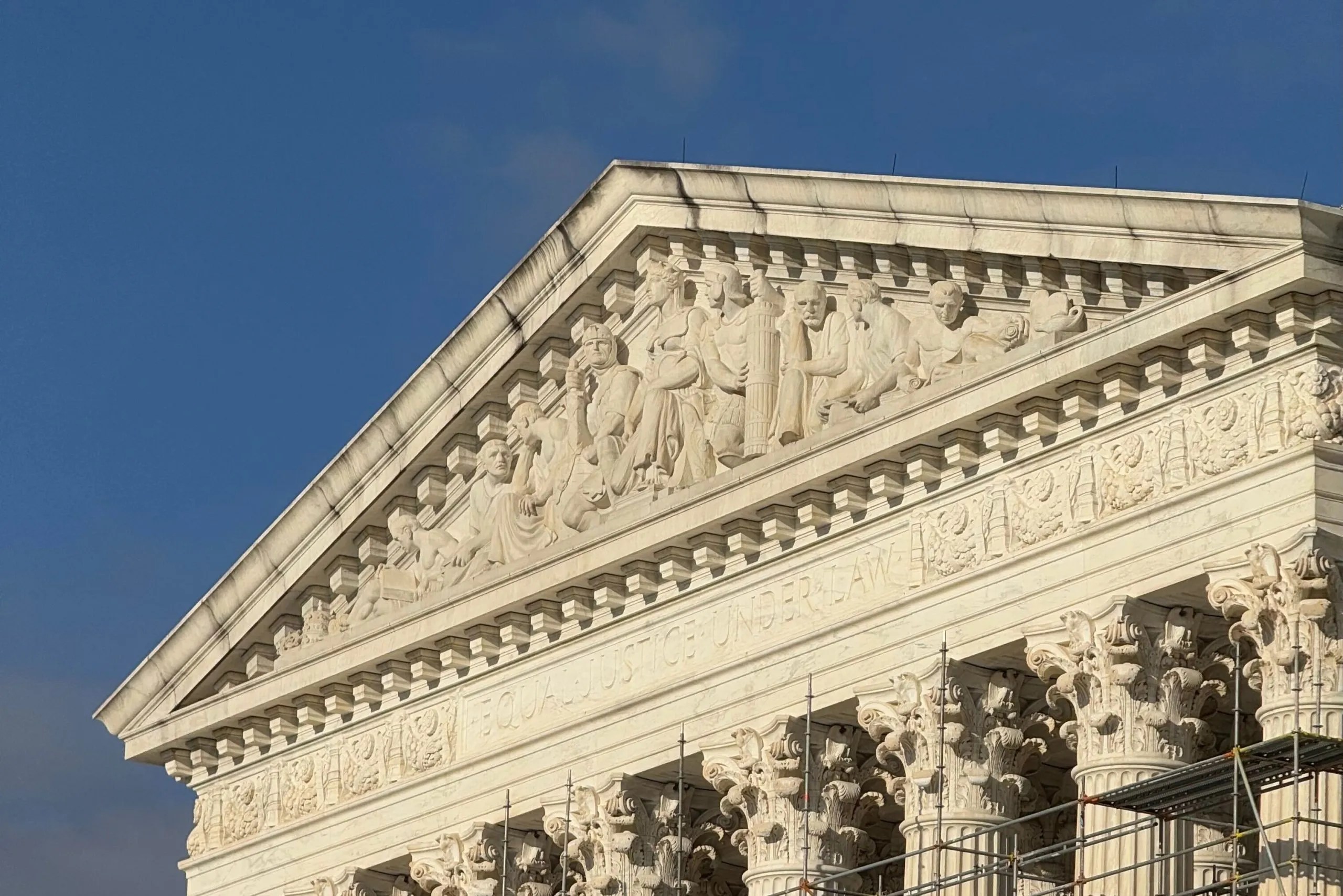SCOTUStoday for Thursday, October 16


You’ve likely heard of the debate over how to pronounce GIF – gif like the start of “gift” or jif like the peanut butter brand? – but what about the one over Gingles? Wednesday’s argument in Louisiana v. Callais was peppered with contentious references to Gingles factors, which are used to determine if congressional maps dilute a racial minority group’s voting power, and the justices didn’t even seem to agree on if it’s pronounced “Gingles” or “Jingles.”
Morning Reads
- What This Supreme Court Term Means for Future Elections (Lydia Wheeler, The Wall Street Journal) — Louisiana v. Callais, a case on race-based redistricting and the Voting Rights Act that was argued yesterday, is not the only case scheduled for argument in the 2025-26 term that could “change the playing field for how elections are run,” according to The Wall Street Journal. The court will also hear argument on “whether Congress still can limit the amount political parties spend on campaigns in coordination with the candidate they support” in National Republican Senatorial Committee v. Federal Election Commission, and it soon could take up a case on “whether states can count postmarked mail-in ballots that arrive shortly after Election Day.” “This is potentially one of the most consequential terms for election law and voting rights in the Supreme Court in many years,” said New York University law professor Richard Pildes to The Wall Street Journal.
- Judge temporarily blocks the Trump administration from firing workers during the government shutdown (Janie Har, Associated Press) — U.S. District Judge Susan Illston on Wednesday ordered the Trump administration to stop “firing workers during the government shutdown,” according to the Associated Press. “It’s very much ready, fire, aim on most of these programs, and it has a human cost,” she said. “It’s a human cost that cannot be tolerated.” Illston’s order came in a case on the administration’s recent layoffs brought by federal labor unions. This summer, the Supreme Court paused a different order from Illston that had barred the government from carrying out an executive order calling for mass reductions in the federal workforce.
- Trans Idaho athlete’s request to dismiss case denied. Supreme Court could be next (Becca Savransky, Idaho Statesman) — On Tuesday, a federal judge in Idaho denied Lindsay Hecox’s request to dismiss Hecox’s case against an Idaho law “banning transgender women and girls from women’s sports,” holding that “dismissing the case would leave ‘critical questions in limbo,'” according to the Idaho Statesman. Hecox, a transgender student at Boise State University, has also asked the Supreme Court to dismiss the case, which it is set to hear during the current term. In asking the court to dismiss the case, Hecox said that “if she continued with the lawsuit, she would face more harassment that would impact her health, safety and ability to graduate.” The justices will consider that request during their private conference on Friday.
- Why the Supreme Court may choose to uphold Trump’s tariffs: ‘It would be incredibly disruptive to unscramble those eggs’ (Lily Mae Lazarus, Fortune) — Elizabeth Prelogar, who served as U.S. solicitor general during the Biden administration, addressed the court’s decision to weigh in on President Donald Trump’s tariffs during an appearance at Fortune’s Most Powerful Women conference. She stated that “the potential economic fallout” from undoing the tariffs may influence what the court says in the case, according to Fortune. “The court might ultimately really have pause and concern before disrupting the President’s economic policy in this way,” Prelogar said.
- Fighting Colorado’s ban on ‘conversion therapy’ for the free speech I need and my clients deserve in my office (Kaley Chiles, The Denver Post) — In a column for The Denver Post, licensed counselor Kaley Chiles reflected on why she brought her challenge to Colorado’s ban on “conversion therapy” for young people all the way to the Supreme Court. The justices heard argument in her case last week, considering whether the Colorado law violates free speech. “I’ve listened to those who regret being pushed too quickly into medical interventions. Many say they wish someone had slowed down, asked better questions, and helped them find peace in their own bodies. The law in Colorado allows discussions that push young people toward these medical interventions, but it threatens the license of any counselor who would help them pursue the opposite path. That’s not compassion. That’s censorship,” Chiles wrote.
SCOTUS Quick Hits
- The court is done hearing argument for the month. The November sitting begins on Monday, Nov. 3, with Rico v. United States and Hencely v. Fluor Corporation.
- The court on Wednesday denied an application for a stay of execution from Charles Ray Crawford. Justice Sonia Sotomayor wrote a dissent from the denial, joined by Justices Elena Kagan and Ketanji Brown Jackson.
- On Friday, the justices will take part in a private conference to discuss cases and petitions for review. An order list outlining some of what they decide during that conference is expected on Monday at 9:30 a.m. EDT.
A Closer Look: Coverage of Callais
Wednesday’s argument in Louisiana v. Callais, a challenge to Louisiana’s congressional map that could reshape the Voting Rights Act, was almost certainly the most closely watched argument session of the 2025-26 term so far. Several media outlets (including SCOTUSblog) published a story summarizing the debate and predicting the outcome of the case. That said, there were subtle (and sometimes not so subtle) variations on how far each headline went. For those interested, we provide a sample of several below:
Associated Press: Supreme Court seems inclined to limit race-based electoral districts under the Voting Rights Act
The Wall Street Journal: Supreme Court Questions Use of Race in Drawing Voting Districts
The New York Times: Supreme Court Appears Poised to Weaken Voting Rights Act
The Washington Post: Supreme Court seems open to limiting key section of Voting Rights Act
Fox News: Supreme Court signals it may limit key Voting Rights Act rule
ABC News: Supreme Court appears ready to limit key part of Voting Rights Act
The Hill: Supreme Court seems inclined to limit race in redistricting
Politico: Conservative justices seem poised to weaken Voting Rights Act
Vox: It sure looks like the Voting Rights Act is doomed
SCOTUS Quote
MR. MOOPPAN: Again, I — I agree with you. My whole point is what this Court has said again and again and again.
JUSTICE GORSUCH: Oh, I know what it said. I just don’t know what it means.
On Site
Argument Analysis
Amy Howe on Louisiana v. Callais
The Supreme Court on Wednesday appeared ready to strike down a 2024 congressional map that a group of voters has challenged as the product of unconstitutional racial gerrymandering – that is, according to them, it sorts voters based on race in violation of the 14th Amendment’s equal protection clause. During nearly two-and-a-half hours of oral arguments, the court’s conservative justices signaled that they are likely to undermine a key provision of the Voting Rights Act, even if they may not ultimately strike it down altogether. To learn more about Wednesday’s debate, read Amy’s analysis.
Ronald Mann on Ellingburg v. United States
Tuesday’s argument in Ellingburg v. United States turned on whether the ex post facto clause of the Constitution applies to the Mandatory Victims Restitution Act. That clause bars imposing criminal punishments based on statutes not in force when the crime occurred. Because the MVRA was adopted after Holsey Ellingburg’s offense, it would violate the ex post facto clause to apply it to determine Ellingburg’s punishment if the restitution it requires is “criminal” under that clause. In his argument analysis for SCOTUSblog, Ronald Mann predicted that the court will rule “fairly early in the year” that the MVRA can’t be applied to Ellingburg.
Relist Watch
Controlled Substances and Courtroom Candor
In his latest Relist Watch column, John Elwood highlighted petitions on the Second Amendment rights of habitual drug users and a personal injury suit that was barred because the injured party failed to disclose it in his preexisting bankruptcy case. He also took note of four relisted petitions “filed by prisoners filing on their own behalf without representation by lawyers.”
Contributor Corner
The Wrongheaded Religious Freedom Narrative
In his latest Rights and Responsibilities column, Richard Garnett discussed the significance of Landor v. Louisiana Department of Corrections and Public Safety, the only church-state case set for oral argument in the 2025-26 term so far. Garnett acknowledged that the dispute over whether the Religious Land Use and Institutionalized Persons Act authorizes money damages in suits against government employees is not a flashy case, but contended that “it will tell us a lot about the state, and future, of the American experiment in religious liberty under law.”
Landor does more than raise a merely technical question about statutory remedies. It is a reminder that religious freedom means religious freedom for all, and that it is a foundational human right that every person, precisely because he or she is a person, enjoys and that our laws and our Constitution do well in recognizing.
Posted in Featured, Newsletters